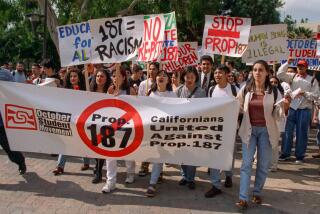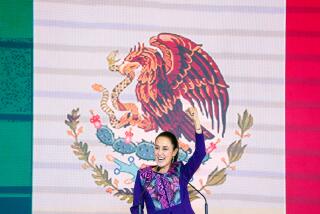A Bigger Piece of the Pie? Feminism Sought New Recipe
Conventional wisdom has it that feminism is dead. But while we may not have achieved what we set out to do 25 years ago--to “change the recipe” of the political process--it is easy to overlook the incredible increase in our “piece of the pie.” I was taken back to that earlier time this weekend, when, as the first state president of the National Women’s Political Caucus of California, I was invited to open its 25th annual convention.
In 1973, shortly after Gloria Steinem and Bella Abzug announced the founding of the national organization to recruit, train and run female, pro-choice candidates for public office, an eclectic group of recent college grads, middle-aged mothers and a sprinkling of seniors met at a local school to review the situation in California.
In that initial meeting, some of us knew each other from various antiwar or presidential campaigns, but this was the first time we had come together to organize ourselves, for ourselves. We hardly looked threatening; but what I remember most clearly was our passion.
At that time, the state’s only female state legislator was appointed: a widow of her assemblyman husband. There were no women mayors of major cities; few women on boards of supervisors. There were a few on commissions that were springboards to elective office, but the appointment process was closed, with no public notice of coming vacancies required. Roe vs. Wade, which legalized abortion, only recently had been decided and no one knew how long that would last. Newspaper employment ads were listed under “men” and “women.”
Starting as a small whirlwind, we grew in size and force to achieve a variety of “firsts.” In 1974, Leona Egeland was elected to the state Assembly, the first woman to be elected without first replacing a dead husband. That year, Janet Gray Hayes was elected mayor of San Jose, the first woman in the nation to govern a city of more than 500,000. We shamed most counties into adopting a policy of 30-day public notice on commission vacancies, and started a talent bank of interested and qualified women to nominate for the appointments.
In retrospect, the dominoes fell relatively quickly. Today, both U.S. senators from California are women. There are seven women members of the state Senate; women make up one-quarter of the Assembly and more than 25% of the state’s congressional delegation. Dozens of mayors and hundreds of city council members and supervisors throughout the state are women.
But when I surveyed the list of workshops at this year’s convention, I was struck by other, less statistically grounded changes. Most of the panels were about finances and money. There were panels on investment strategies for women. In 1973, we had trouble getting credit cards in our own names--and forget about a loan. A portfolio was how an artist carried her drawings.
As I spoke with several other “veterans” of the earliest campaigns, I was struck that while many of us are now more involved in our communities than organizations, our hearts and minds are still feminist. Most agreed that campaign-finance reform, including “free” television time to combat the huge portion of every campaign dollar that goes to advertizing, remains a paramount issue of concern for anyone seeking to change the status quo. With all the discussion of feminists “defending” President Bill Clinton, I found them infuriated, if not at his alleged actions, at their net result: the lost opportunity to make real changes in insurance, day care, education and health care. You see, we still harbor hope of “changing the recipe.”
It is both humbling and inspiring to feel a small part of all that has been accomplished and all that remains to be achieved. These were serious activists gathering this weekend and, to a woman, they answered a resounding “no” to the Time magazine cover question: “Is Feminism Dead?”
When Time put Ally McBeal on their cover, next to Susan B. Anthony, Betty Friedan and Gloria Steinem, they made a decision to incite and insult. If they had to use a face, why not Justice Ruth Bader Ginsburg or Sen. Dianne Feinstein or Rebecca Lobo?
Yet, perhaps this is a reflection of the success we have had at breaking down barriers. Hopefully, young women today take for granted that they can be anything they want to be: a Supreme Court justice, a U.S. senator, a WNBA player or someone like Ally McBeal, who may be insecure and self-absorbed but is, after all, a lawyer.
From where we sat 25 years ago, that’s not so bad.
More to Read
Get the L.A. Times Politics newsletter
Deeply reported insights into legislation, politics and policy from Sacramento, Washington and beyond. In your inbox three times per week.
You may occasionally receive promotional content from the Los Angeles Times.










